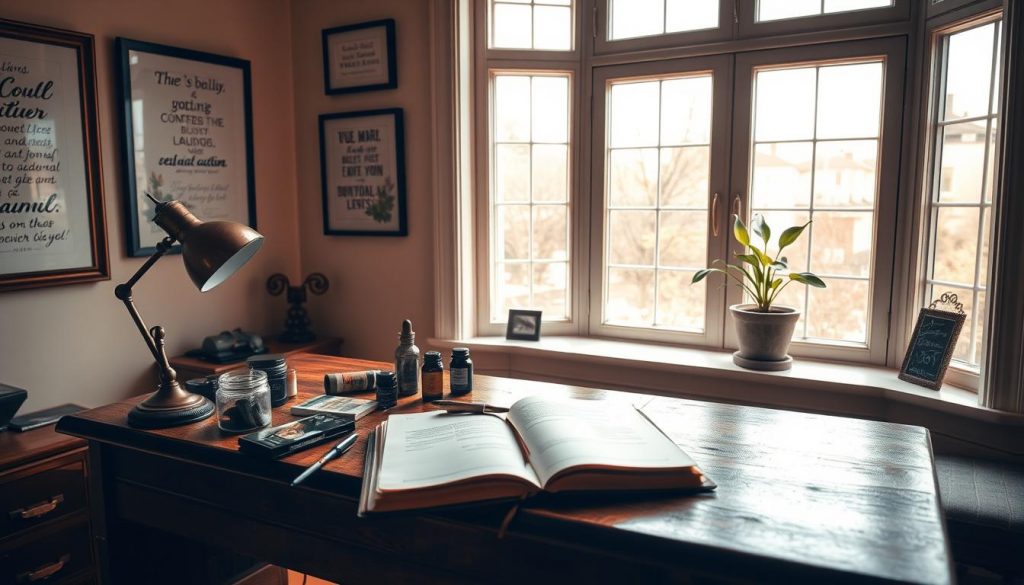Ever thought you’re too old for a diary? Age myths might have stopped you, but it’s time to face them. Senior writing is not just possible, it’s powerful. Studies show people over 40 are great at reflecting and understanding life’s complexities.
There’s no age limit on sharing your thoughts. Many believe journaling is for the young. But, starting a diary later in life can be incredibly rewarding. It opens up new ways to grow and discover yourself.
Overcoming age myths in senior writing takes courage and curiosity. Your life experiences are full of wisdom. Whether you’re 45 or 75, your story is important. Learning, reflecting, and expressing yourself doesn’t get worse with age—it gets better.
Older adults often have a deeper perspective than younger writers. You’ve lived, learned, and gained valuable insights. Forget being too old to start a diary. You’re perfectly aged to begin your most genuine writing journey.
Understanding the Benefits of Keeping a Diary
Journaling is more than just writing down thoughts. It’s a powerful tool for personal growth and self-discovery. It helps you understand yourself in a unique way.
Many people don’t realize how journaling can change their lives. About 47% of people use journals to process their emotions. This shows how widely it can help.
Emotional Health and Wellbeing
Keeping a diary is like a mental health safety valve. It helps you:
- Process complex emotions
- Reduce stress and anxiety
- Develop emotional intelligence
- Create a safe space for personal expression
“Writing for no audience serves as good practice” – Virginia Woolf
Self-Discovery and Reflection
Diary writing lets you track your personal growth. It gives you a chance to review and reflect on your evolution. It’s like mapping your emotional and intellectual journey.
Boosting Creativity and Expression
Regular journaling can make you a better writer. It’s like practicing scales for musicians. It helps you find your true voice and explore your varieties of yourself.
Starting a diary, no matter your age, can be life-changing. It offers emotional relief, a creative outlet, and deep self-understanding.
The Ideal Age to Start a Diary
Late-start journaling lets you capture your life’s story, no matter when you start. Many adults think they’ve missed the diary boat. But, your thoughts and experiences never expire.

Starting to write later in life has its perks. Older adults bring a wealth of life experiences to their journals. This makes their entries wise and full of depth.
No Boundaries for Journaling
Adult journaling knows no age limits. Here are some reasons to start your diary:
- Life experiences give deeper insights
- Maturity brings self-awareness
- More time for reflection
- Stronger motivation to share personal stories
Inspirational Diary Keepers Across Generations
Many famous people started journaling later in life. This shows that creativity has no age limit:
| Name | Age Started | Notable Achievement |
|---|---|---|
| Maya Angelou | 40s | Award-winning memoir writer |
| Anne Lamott | 30s | Bestselling author |
| Joan Didion | 50s | Acclaimed journalist |
Transformative Late-Start Journaling
“Your story matters, regardless of when you choose to tell it.” – Unknown
Research shows journaling’s benefits at any age. 78% of diary users say writing helps them process experiences and emotions. This highlights journaling’s healing power at any age.
Start your diary today. Your story is unique, your experiences are worth sharing, and it’s never too late to begin.
Common Misconceptions About Age and Journaling
Many people think journaling is only for the young. They believe it’s a practice for teens or young adults. This thinking can stop them from growing and expressing themselves.

Studies show that how we see aging affects our minds. Starting late with journaling can bring big benefits. Here are some important points about age and writing:
- Control beliefs peak during midlife and can be enhanced through reflective practices
- Individuals with higher perceived control report better health outcomes
- Age is not a barrier to meaningful self-discovery
The Myth: Journaling Is Only for Teens
Journaling knows no age limits. Self-reflection is a timeless skill that anyone can learn. Over 85 million Americans between 40 and 59 could greatly benefit from it.
The Assumption: It’s Too Late to Change Your Life
People with strong control beliefs tend to grow more. The MIDUS study found midlife, 44 to 59, is perfect for change and self-discovery.
“Age is an opportunity to refine, not restrict, your personal narrative.”
Age-Related Bias in Self-Expression
| Age Group | Perceived Control | Journaling Potentia |
|---|---|---|
| 25-45 | High | Emerging Self-Understanding |
| 45-65 | Peak | Deep Reflection |
| 65+ | Adaptive | Wisdom Capturing |
Overcoming age biases lets us express ourselves deeply. Your journey of self-discovery has no age limit.
How a Diary Can Enhance Your Life at Any Age
Writing can be a great way for seniors to explore themselves and stay mentally well. By jotting down daily routines, you can make life’s moments more memorable.

Many find that a diary is a key to personal growth, no matter their age. Studies show that writing down life experiences boosts mental clarity and emotional health.
Capturing Memories and Milestones
Journaling helps you keep your most valued memories in detail. As Jessamyn West noted, diary keepers live life twice – once by experiencing it and again by reflecting on it.
- Preserve family stories and personal history
- Create a lasting legacy for future generations
- Capture nuanced emotional experiences
Enhancing Mental Clarity and Focus
Writing regularly can improve your thinking skills and mental health. Harvard University found that writing about daily events makes them more meaningful over time.
“Keeping a diary helps strengthen one’s inner voice, providing an opportunity for self-discovery without self-censorship.” – Writing Expert
| Journaling Benefit | Potential Impact |
|---|---|
| Emotional Release | Improved mental health |
| Memory Preservation | Enhanced personal narrative |
| Cognitive Stimulation | Increased mental sharpness |
Starting to journal at any age can change your life. It offers a special way to understand yourself and grow.
Choosing the Right Format for Your Diary
Adult journaling offers many ways to express yourself, from classic notebooks to digital platforms. Your diary journey can take many forms, based on what you like and how tech-savvy you are.

Modern adult journaling brings exciting options for recording your thoughts and experiences. The diary format you choose can greatly affect your writing experience and how often you write.
Traditional Paper Journals
Paper journals are a favorite among many adult journaling fans. They offer special benefits:
- Tactile writing experience
- No battery or internet needed
- Feels personal and intimate
- Easy to add stickers or drawings
Digital Journaling Options
Digital platforms are changing how we start a diary. Apps and online journals offer convenience and extra features:
- Automatic cloud backup
- Search function
- Password protection
- Easy editing and organizing
Specialized Journaling Formats
Try creative diary styles to meet your personal goals:
- Bullet Journals: A structured planning method
- Digital Apps: WriteDiary, Penzu and Day One
- Themed Journals: For travel, gratitude, or personal growth
“The best diary is the one you’ll actually use consistently.”
Pick a format that feels natural and keeps you motivated to write regularly. Whether it’s digital or analog, your diary is a personal space for reflection and growth.
Tips for Starting Your Diary Journey
Starting an adult diary might seem daunting, but it’s never too late. Research shows 70% of adults over 30 think it’s okay to start now. Your life experiences make it a great chance for self-discovery and growth.

Creating a Realistic Writing Schedule
Setting a doable routine is key when starting a diary. Here are some tips:
- Begin with 5-10 minutes each day
- Pick a time that works for you
- Be okay with changing your schedule
- Don’t stress if you miss a day
Discovering Your Unique Journaling Style
Everyone has their own writing voice. Try different journaling styles to find what suits you best:
| Journaling Style | Description |
|---|---|
| Stream of Consciousness | Writing without stopping to edit |
| Gratitude Journaling | Writing about the good things each day |
| Reflective Writing | Thinking deeply about your experiences and feelings |
“Journaling is a powerful tool for processing emotions and capturing life’s moments.” – Tavi Gevinson
People who journal often feel 50% happier. Your diary is your own space. It’s okay to make mistakes and enjoy the process of self-expression.
Find what makes you feel comfortable. It could be a traditional notebook or a digital app. The most important thing is to enjoy the journey of starting your diary.
Overcoming Self-Doubt About Writing
Writing can spark powerful self-reflection, even when inner critics try to silence your creative voice. Many writers struggle with self-doubt. But understanding its nature can change how you approach creative writing.
- 70% of writers report experiencing self-doubt during their writing process
- 90% of creative professionals experience impostor syndrome
- 85% of artistic individuals face anxiety about their creative output
Embracing Imperfection in Your Entries
Your journal is a personal sanctuary for exploration. Perfection is not the goal. Award-winning poet Philip Schultz says emotional truth is more important than flawless prose.
“The ‘shitbird’ of self-doubt can be transformed into a creative ally.” – Philip Schultz
Finding Inspiration in Everyday Life
Inspiration surrounds you. Mundane moments can become powerful writing opportunities. Consider capturing:
- Overheard conversations
- Unexpected emotions
- Small daily observations
| Self-Doubt Challenge | Productive Response |
|---|---|
| Negative inner critic | Acknowledge, then write regardless |
| Fear of imperfection | Embrace your unique voice |
| Comparison to others | Focus on personal growth |
Remember, 90% of writers believe a positive mindset boosts creative output. Your words matter, no matter the perceived flaws.
Creating a Safe Space for Your Thoughts
Writing and recording daily routines can change your life. Journaling is a great way for seniors to share their thoughts and experiences. It’s a meaningful way to document your life.
When you start writing, keeping your thoughts private is key. Many worry about who might see their journal.
Protecting Your Personal Narrative
- Choose a secure location for physical journals
- Use password-protected digital platforms
- Consider locked storage options
- Select journals with built-in locks
Designing Your Ideal Journaling Routine
Setting up a journaling routine takes some planning. Studies show that 5-10 minutes a day can make it a habit.
| Time of Day | Recommended Duration | Benefits |
|---|---|---|
| Morning | 5-10 minutes | Clarify thoughts, set intentions |
| Evening | 10-15 minutes | Reflect on daily experiences |
“Writing is a form of therapy; sometimes I wonder how all those who do not write, compose, or paint can manage to escape the madness, melancholia, the panic, and fear which is inherent in a human situation.” – Graham Greene
Interestingly, 58% of adults think journaling helps them understand their feelings. By making a private space for writing, you gain a powerful tool for growth and emotional health.
Examples of Different Diary Styles
Adult journaling offers a wide range of creative writing styles. Each style offers a unique way to reflect on yourself and express your thoughts. Trying out different formats can help you find the best way to share your experiences.
Starting a journaling journey means finding a style that fits your goals and interests. Different diary formats can change how you write and help you understand yourself better.
Gratitude Journals
Gratitude journals focus on the good things in life. They help you stay positive and improve your mental health. By writing about the things you’re thankful for, you can:
- Reduce stress and anxiety
- Improve overall emotional well-being
- Develop a more optimistic outlook
Travel Diaries
Travel diaries capture your adventures and keep memories alive. They mix creative writing with personal stories. This way, you can:
- Document unique cultural encounters
- Reflect on personal growth through travel
- Create a lasting memento of your journeys
Reflective Journals
Reflective journals dive deep into your experiences and insights. They offer a structured way to reflect on your life. This helps you process complex emotions and events.
| Diary Style | Primary Purpose | Key Benefits |
|---|---|---|
| Gratitude Journal | Acknowledging positive experiences | Improved mental health |
| Travel Diary | Documenting adventures | Preserving memories |
| Reflective Journal | Processing life experiences | Personal growth |
Remember, there’s no single “right” way to journal. The most important aspect is finding a style that feels authentic and meaningful to you.
“Writing is a powerful tool for understanding ourselves and our world.” – Anonymous
Your Next Steps: Time to Start Writing!
Starting a diary can change your life, even for seniors. It’s a way to express yourself deeply. Studies show that writing just one sentence a day can help you keep a journaling habit. This can lead to a 20-30% boost in well-being through expressive writing.
Don’t worry about making your diary perfect. About 70% of people face writer’s block at first. But keep going. Pick a journal that excites you. A good pen and a notebook that feels special can make you write more, by 40%.
Making the First Entry
Your first entry doesn’t have to be long. Just write about what you’re thinking or feeling today. About 85% of people feel better after writing. If you’re stuck, think about a recent memory or your day. Or write about a goal you’ve been thinking about.
Committing to the Journey
Make journaling a part of your daily routine. This can help you write more regularly. Aim to write 3-5 times a week for better emotional clarity. Remember, your diary is for you to reflect, grow, and discover yourself.
FAQ
Am I really too old to start a diary?
Absolutely not! There’s no age limit for journaling. Older adults bring a wealth of life experiences. These experiences make their diary entries rich and meaningful. Starting a diary later in life can be rewarding.
What are the benefits of keeping a diary for older adults?
Journaling helps seniors in many ways. It improves emotional well-being and cognitive function. It also offers a creative outlet for self-expression. It helps process life experiences and preserve memories.
I’m not a good writer. Can I keep a diary?
Absolutely! Journaling is about self-expression, not perfect writing. Your diary is a personal space with no rules. Focus on capturing your thoughts and feelings authentically.
What’s the best format for keeping a diary?
There’s no single “best” format. You can choose from paper journals, digital apps, bullet journals, or planners. Think about your comfort with technology and writing preferences. Some seniors prefer handwriting, while others like digital platforms.
How often should I write in my diary?
There’s no strict rule. Some write daily, while others write weekly or whenever they feel like it. The key is to find a routine that feels comfortable and sustainable for you.
What should I write about in my diary?
Your diary can include anything that matters to you. This can be daily experiences, memories, gratitude, travel adventures, or personal reflections. The most important thing is to write what feels meaningful to you.
How can I overcome self-doubt about starting a diary?
Embrace imperfection and focus on the joy of self-expression. Remember, your experiences are valuable. There’s no “right” way to journal. Start small, be kind to yourself, and find inspiration in your everyday life.
How do I ensure privacy for my diary?
Choose a secure method of journaling that makes you comfortable. For physical journals, consider a locked drawer or personal safe. Digital platforms often offer password protection and encryption. The most important thing is feeling safe and confident in your writing space.
Source Links
- When is it Too Late to Start a Business?
- Debunking Myths About Aging
- Dear Diary: how keeping a journal can bring you daily peace
- Why do people keep diaries or journals?
- The Benefits of Keeping a Diary
- Reasons Why Your Child Should Keep a Diary or Journal
- I’ve written a diary every day since I was 14. What does that say about me?
- What’s the Right Age to Start Journaling?
- Perceived Control and Aging: A Mini Review and Directions for Future Research
- Midlife as a Pivotal Period in the Life Course: Balancing Growth and Decline at the Crossroads of Youth and Old Age
- 7 Truths About Keeping a Diary From 10 Brilliant Minds
- Keeping a Journal – Advantages and Challenges | Naturally Balanced
- Celebrated Writers on the Creative Benefits of Keeping a Diary
- Penzu
- A Beginner’s Guide To Journaling & Writing Daily Diary Entries
- How to Start and Keep a Journal
- Unveiling Your Story: A Step-by-Step Guide to Turning Your Diary into an Autobiography
- On Writing, Teaching, and Defeating the “Shitbird” of Self-Doubt: A Conversation with Philip Schultz – Caitlin Doyle – Literary Matters
- Conquering the Clock: My Journey to Writing Stop Procrastinating Tomorrow
- Do You Ever Have Feelings of Self-Doubt? — You are not alone.
- How To Start A Journal: The Ultimate Guide For Beginners – She Dreams All Day
- Content – Health Encyclopedia – University of Rochester Medical Center
- Dear Diary (books written in letter, diary or journal format) – MARINet
- What are the Types of Diaries and How to use a Diary?
- Dear Diary: Journal-Style Fiction for Schoo- Aged Readers
- I’ve kept a diary since 1997. Here’s how I stay consistent. The Freelance Writer’s Guide
- How to Start Writing a Diary for Yourself: Best choice you make

